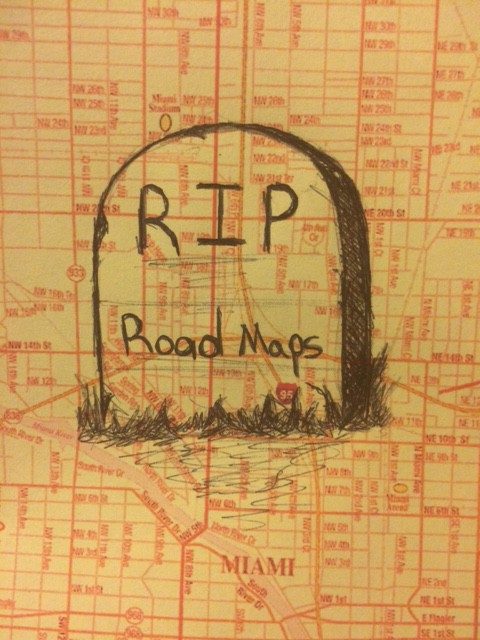A Eulogy To Road Maps
Dearly beloved, we are gathered here today to say our final farewell to the last American paper road map.
Once upon a time, the classic paper road map, also known as an atlas, was a mainstay in every car, and a near necessity for long distance road trips. Sadly, global positioning systems, commonly knows as the GPS, have killed the road map.
You were a quiet companion that was always ready to help a driver in need. Road maps came in all shapes and sizes too. Like the massive, windshield-sized portrait version of the atlas that covers the length of most car hoods so perfectly that most studying of those cartographic behemoths occurred exclusively there. Oversized road map, you will be remembered best for your extensive network of creases. These elaborate fault lines are created when the user of the map becomes an expert origami artist at a moment’s notice, just to fold that monster down to a manageable storage size.

You were also flexible. You would spend most of your time in a car trunk beneath jumper cables and tire irons, or stuffed in a glove compartment between Wu-Tang Clan cassettes and bright yellow napkins from a Wendy’s drive-thru.
But when summoned you would always guide the driver to his destination by destroying his vision as he squinted at the tiny lines that you used to mark city streets, or the slightly thicker tiny lines that were used to indicate major highways.
Road map, you were usually handled by the front seat passenger, who would treat your clear markings like ancient Egyptian hieroglyphics that must be deciphered and translated for the driver. And you never complained.
You always did your job with quiet dignity, unlike the new navigators that are ultimately responsible for your death, like MapQuest, a website that calculates driving routes for travelers. It’s a fine tool for business travel, but the robotic, point A to point B style of MapQuest, falls short of your big picture brilliance road map. MapQuest’s specificity leaves little room for error or exploration. MapQuest demands that you follow its instructions from start to finish, and if I want to do something along the way I’m going to have to request another set of directions.
Then there’s that pompous GPS on my phone that commands me to “turn right in 1,000 feet” and is even bold enough to turn my music down so that every 50 feet it can remind me to make the exact same turn. And God forbid I actually miss the turn it insisted I make, the arrogant GPS will tell me that it’s “recalculating” its route in a voice that implies absolute frustration with the imperfection of my humanity.
Road maps were never rude to anyone.
Sadly, according to the U.S. Department of Transportation, two-thirds of people feel more comfortable navigating with a GPS. Eighty-three percent of people own a road map, but only one third permanently carry it in their car.
You were mistreated, underappreciated and taken for granted. Now you must be your own guide to an unsure future. Rest in peace road map. You will be missed. Or not.

